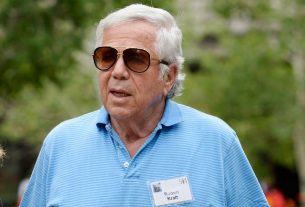But I ran out of places and friendly faces/ Because I had to be free/ I’ve been to paradise but I’ve never been to me – Charlene: “I’ve Never Been to Me”
This week we read a double Torah portion of Nitzavim and Vayelech. It’s the final charge given to the Jewish people by Moses on the last day of his life.
Rabbi Jonathan Sachs writes: “When I was a student at university in the late 1960s – the era of student protests, psychedelic drugs, and the Beatles meditating with the Maharishi Mahesh Yogi – a story went the rounds. An American Jewish woman in her sixties traveled to north India to see a celebrated guru. There were huge crowds waiting to see the holy man, but she pushed through, saying that she needed to see him urgently. Eventually, after weaving through the swaying crowds, she entered the tent and stood in the presence of the master himself. What she said that day has entered the realm of legend. She said, “Marvin, listen to your mother. Enough already. Come home.”
He continues: “Starting in the sixties, Jews made their way into many religions and cultures with one notable exception: their own. Yet Judaism has historically had its mystics and meditators, its poets and philosophers, its holy men and women, its visionaries and prophets. It has often seemed as if the longing we have for spiritual enlightenment is in direct proportion to its distance, its foreignness, its unfamiliarity. We prefer the far to the near.”
Moses already foresaw this possibility: “Now, what I am commanding you today is not too difficult for you or beyond your reach. It is not in heaven, so that you have to ask, ‘Who will ascend into heaven to get it and proclaim it to us so we may obey it?’ Nor is it beyond the sea, so that you have to ask, ‘Who will cross the sea to get it and proclaim it to us so we may obey it?’ No, the word is very near you; it is in your mouth and in your heart so you may obey it (Deut. 30:11-14).”
Rabbi Sachs concludes: “Moses sensed prophetically that in the future, Jews would say that to find inspiration, we have to ascend to heaven or cross the sea. It is anywhere but here.”
Don’t spurn tried-and-tested methods for get-rich-quick schemes
The same holds true for finance as well. I can’t tell you how many people aren’t satisfied with tried-and-tested ways of growing wealth, and they search out get-rich-quick or esoteric, untested means to create a nest egg.
A few weeks ago, I spoke to a retired couple that was thinking about making aliyah. They had about $500,000 in cash from the sale of a property. After going through their entire financial situation, I suggested a diversified portfolio using exchange-traded funds (ETFs) linked to broad-based market indices, as well as FDIC-insured CDs (certificates of deposit).
They said their son has dabbled in trading commodities, and he suggested that they also invest this way. They started asking me about my opinion on investing in cocoa, orange juice, and wheat. I cynically said that if you mean buying chocolate milk, some Tropicana with pulp, or a loaf of bread, all is good, but if this is your retirement plan, you’re crazy.
When it comes to growing wealth, it’s not so complicated. Keep it simple. Stay away from social-media reels where debt and zero-down real estate are hailed as sound financial advice.
I know it’s boring and that I sound like a broken record. But the advice I am going to give actually works! First of all, start living within your means. No one other than Visa and Mastercard get rich by taking on personal debt and living in overdraft. Make a budget, and if in debt, make it a priority to get out of it as soon as possible.
Then you need to make saving and investing a priority. Make a habit of “paying yourself first” every month. Whether you invest in real estate (where you get a monthly rent check) with little or no leverage, or you invest in a well-diversified stock and bond portfolio, focus on a slow and steady approach to build wealth. Don’t make the mistake of being “too smart.”
It’s not just wheat. I could write a book about the crazy investment ideas that I have seen people throw money at – all in the hope of achieving an outsized return. What usually happens is that these schemes blow up, and most or all of their investment is lost. Keep in mind the basic principle: If it sounds too good to be true, it probably is.
I can’t stress enough the importance of just starting. Don’t procrastinate. Too often, individuals delay investing because they think they don’t have enough money or that the market is too high. They think if they don’t have hundreds of thousands of dollars, there is no point investing. So they end up keeping their money in a 0%-interest account in the bank. Or they say the market is trading near all-time highs, so they will invest after the market drops.
Don’t think you have the secret sauce and can time market movements. If most successful investors can’t time the market, why do you think you can?
There is no need to search long and far; the path to a secure financial future is right in front of you. Just follow the basic principles and keep it simple.
The information contained in this article reflects the opinion of the author and not necessarily the opinion of Portfolio Resources Group, Inc. or its affiliates.
Aaron Katsman is the author of Retirement GPS: How to Navigate Your Way to A Secure Financial Future with Global Investing.




